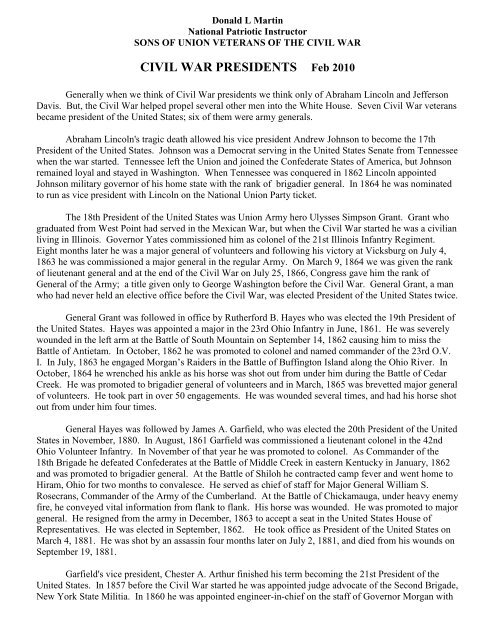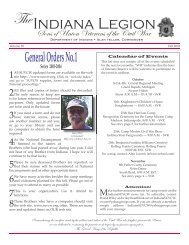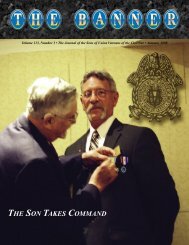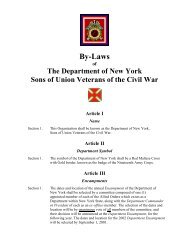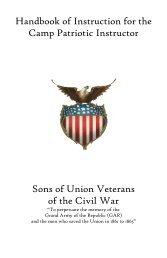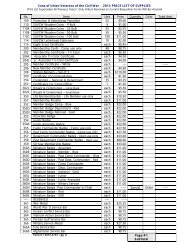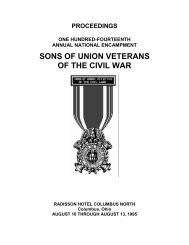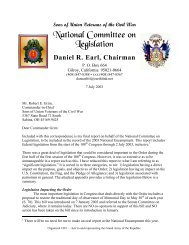February 2010 - Sons of Union Veterans of the Civil War
February 2010 - Sons of Union Veterans of the Civil War
February 2010 - Sons of Union Veterans of the Civil War
You also want an ePaper? Increase the reach of your titles
YUMPU automatically turns print PDFs into web optimized ePapers that Google loves.
Donald L MartinNational Patriotic InstructorSONS OF UNION VETERANS OF THE CIVIL WARCIVIL WAR PRESIDENTS Feb <strong>2010</strong>Generally when we think <strong>of</strong> <strong>Civil</strong> <strong>War</strong> presidents we think only <strong>of</strong> Abraham Lincoln and JeffersonDavis. But, <strong>the</strong> <strong>Civil</strong> <strong>War</strong> helped propel several o<strong>the</strong>r men into <strong>the</strong> White House. Seven <strong>Civil</strong> <strong>War</strong> veteransbecame president <strong>of</strong> <strong>the</strong> United States; six <strong>of</strong> <strong>the</strong>m were army generals.Abraham Lincoln's tragic death allowed his vice president Andrew Johnson to become <strong>the</strong> 17thPresident <strong>of</strong> <strong>the</strong> United States. Johnson was a Democrat serving in <strong>the</strong> United States Senate from Tennesseewhen <strong>the</strong> war started. Tennessee left <strong>the</strong> <strong>Union</strong> and joined <strong>the</strong> Confederate States <strong>of</strong> America, but Johnsonremained loyal and stayed in Washington. When Tennessee was conquered in 1862 Lincoln appointedJohnson military governor <strong>of</strong> his home state with <strong>the</strong> rank <strong>of</strong> brigadier general. In 1864 he was nominatedto run as vice president with Lincoln on <strong>the</strong> National <strong>Union</strong> Party ticket.The 18th President <strong>of</strong> <strong>the</strong> United States was <strong>Union</strong> Army hero Ulysses Simpson Grant. Grant whograduated from West Point had served in <strong>the</strong> Mexican <strong>War</strong>, but when <strong>the</strong> <strong>Civil</strong> <strong>War</strong> started he was a civilianliving in Illinois. Governor Yates commissioned him as colonel <strong>of</strong> <strong>the</strong> 21st Illinois Infantry Regiment.Eight months later he was a major general <strong>of</strong> volunteers and following his victory at Vicksburg on July 4,1863 he was commissioned a major general in <strong>the</strong> regular Army. On March 9, 1864 we was given <strong>the</strong> rank<strong>of</strong> lieutenant general and at <strong>the</strong> end <strong>of</strong> <strong>the</strong> <strong>Civil</strong> <strong>War</strong> on July 25, 1866, Congress gave him <strong>the</strong> rank <strong>of</strong>General <strong>of</strong> <strong>the</strong> Army; a title given only to George Washington before <strong>the</strong> <strong>Civil</strong> <strong>War</strong>. General Grant, a manwho had never held an elective <strong>of</strong>fice before <strong>the</strong> <strong>Civil</strong> <strong>War</strong>, was elected President <strong>of</strong> <strong>the</strong> United States twice.General Grant was followed in <strong>of</strong>fice by Ru<strong>the</strong>rford B. Hayes who was elected <strong>the</strong> 19th President <strong>of</strong><strong>the</strong> United States. Hayes was appointed a major in <strong>the</strong> 23rd Ohio Infantry in June, 1861. He was severelywounded in <strong>the</strong> left arm at <strong>the</strong> Battle <strong>of</strong> South Mountain on September 14, 1862 causing him to miss <strong>the</strong>Battle <strong>of</strong> Antietam. In October, 1862 he was promoted to colonel and named commander <strong>of</strong> <strong>the</strong> 23rd O.V.I. In July, 1863 he engaged Morgan’s Raiders in <strong>the</strong> Battle <strong>of</strong> Buffington Island along <strong>the</strong> Ohio River. InOctober, 1864 he wrenched his ankle as his horse was shot out from under him during <strong>the</strong> Battle <strong>of</strong> CedarCreek. He was promoted to brigadier general <strong>of</strong> volunteers and in March, 1865 was brevetted major general<strong>of</strong> volunteers. He took part in over 50 engagements. He was wounded several times, and had his horse shotout from under him four times.General Hayes was followed by James A. Garfield, who was elected <strong>the</strong> 20th President <strong>of</strong> <strong>the</strong> UnitedStates in November, 1880. In August, 1861 Garfield was commissioned a lieutenant colonel in <strong>the</strong> 42ndOhio Volunteer Infantry. In November <strong>of</strong> that year he was promoted to colonel. As Commander <strong>of</strong> <strong>the</strong>18th Brigade he defeated Confederates at <strong>the</strong> Battle <strong>of</strong> Middle Creek in eastern Kentucky in January, 1862and was promoted to brigadier general. At <strong>the</strong> Battle <strong>of</strong> Shiloh he contracted camp fever and went home toHiram, Ohio for two months to convalesce. He served as chief <strong>of</strong> staff for Major General William S.Rosecrans, Commander <strong>of</strong> <strong>the</strong> Army <strong>of</strong> <strong>the</strong> Cumberland. At <strong>the</strong> Battle <strong>of</strong> Chickamauga, under heavy enemyfire, he conveyed vital information from flank to flank. His horse was wounded. He was promoted to majorgeneral. He resigned from <strong>the</strong> army in December, 1863 to accept a seat in <strong>the</strong> United States House <strong>of</strong>Representatives. He was elected in September, 1862. He took <strong>of</strong>fice as President <strong>of</strong> <strong>the</strong> United States onMarch 4, 1881. He was shot by an assassin four months later on July 2, 1881, and died from his wounds onSeptember 19, 1881.Garfield's vice president, Chester A. Arthur finished his term becoming <strong>the</strong> 21st President <strong>of</strong> <strong>the</strong>United States. In 1857 before <strong>the</strong> <strong>Civil</strong> <strong>War</strong> started he was appointed judge advocate <strong>of</strong> <strong>the</strong> Second Brigade,New York State Militia. In 1860 he was appointed engineer-in-chief on <strong>the</strong> staff <strong>of</strong> Governor Morgan with
<strong>the</strong> rank <strong>of</strong> brigadier general, New York State Militia. In July 1862 he was named quartermaster generalwith <strong>the</strong> rank <strong>of</strong> brigadier general. Arthur finished Garfield's presidential term but was unable to get <strong>the</strong>Republican Party to nominate him in 1884.Grover Cleveland who paid a substitute to take his place in <strong>the</strong> <strong>Civil</strong> <strong>War</strong> was elected in 1884 as <strong>the</strong>22nd President, but he was defeated in 1888 by <strong>Civil</strong> <strong>War</strong> General Benjamin Harrison. The 23rd President<strong>of</strong> <strong>the</strong> United States was born in North Bend, Ohio and graduated from Miami University, Oxford, Ohio, butlived in Indianapolis when <strong>the</strong> <strong>Civil</strong> <strong>War</strong> started and was commissioned a 2nd lieutenant <strong>of</strong> IndianaVolunteers in July, 1862. He formed Company A, <strong>of</strong> <strong>the</strong> 70th Regiment, Indiana Volunteer Infantry, andwas made captain. At <strong>the</strong> organization <strong>of</strong> <strong>the</strong> regiment he was commissioned colonel and went with <strong>the</strong>regiment to Kentucky and served until June, 1865. The unit distinguished <strong>the</strong>mselves in <strong>the</strong> Atlantacampaign and at Nashville. By <strong>the</strong> end <strong>of</strong> <strong>the</strong> war Harrison had been appointed Brigadier General.The last <strong>Civil</strong> <strong>War</strong> veteran to serve as President <strong>of</strong> <strong>the</strong> United States was Major William McKinleywho was elected 25th President <strong>of</strong> <strong>the</strong> United States in 1896 and took <strong>of</strong>fice March 4, 1897. On June 11,1861 he enlisted as a private in <strong>the</strong> 23rd Ohio Volunteer Infantry Regiment. This unit was led byRu<strong>the</strong>rford B. Hayes who served as our 19th President. In April, 1862 he was promoted to commissarysergeant. His action in keeping hot c<strong>of</strong>fee and food at <strong>the</strong> front during <strong>the</strong> Battle <strong>of</strong> Antietam resulted in hisbeing commissioned a second lieutenant. A monument in his honor has also been erected on <strong>the</strong> Antietambattlefield. In Feb., 1863 he was promoted to first lieutenant. In July, 1863 he was promoted to captainduring <strong>the</strong> campaign in sou<strong>the</strong>rn Ohio to capture confederate General John Morgan. March 13, 1865 he wasbrevetted major <strong>of</strong> volunteers for gallant and meritorious services at <strong>the</strong> battles <strong>of</strong> Opequan, Fisher's Hilland Cedar Creek. He was re-elected President in 1900 starting his second term on March 4, 1901 but wasshot by an assassin on September 6, 1901 and died from his wounds a few days later on September 14, 1901Holidays and o<strong>the</strong>r special dayshttp://suvcw.org/ftp/PI_handbook.pdfNational, Federal and Special holidays – Days <strong>the</strong> Flag should be Flown<strong>February</strong> 1 - National Freedom Day First observed on <strong>February</strong> 1, 1949The purpose <strong>of</strong> this holiday is to promote good feelings, harmony, and equal opportunity among all citizensand to remember that <strong>the</strong> United States is a nation dedicated to <strong>the</strong> ideal <strong>of</strong> freedom. Major Richard RobertWright Sr., a former slave, fought to have a day when freedom for all Americans iscelebrated. When Wright got his freedom, he went on to become a successful businessman and communityleader in Philadelphia, Pennsylvania.Major Wright chose <strong>February</strong> 1 as National Freedom Day because it was <strong>the</strong> day in 1865 that PresidentLincoln signed <strong>the</strong> 13th Amendment to <strong>the</strong> Constitution. This amendment, an important change to ourwritten law, outlawed slavery in <strong>the</strong> United States. Wright ga<strong>the</strong>red national and local leaders toge<strong>the</strong>r towrite a bill declaring <strong>February</strong> 1 "National Freedom Day" and President Harry Truman signed <strong>the</strong> bill onJune 30, 1948 making it <strong>of</strong>ficial.<strong>February</strong> 12 – <strong>Union</strong> Defender’s Day or Abraham Lincoln’s Birthday First observed 1866Abraham Lincoln, perhaps our greatest President, gives us insight into <strong>the</strong> qualities desired in leadership.Clearly Abraham Lincoln is considered one <strong>of</strong> <strong>the</strong> greatest U.S. Presidents <strong>of</strong> all time. From his humble logcabin beginnings to his martyrdom, his intellect, determination, humility, wit, and savvy is recognized. Hisdetermination to keep <strong>the</strong> nation toge<strong>the</strong>r during <strong>the</strong> <strong>Civil</strong> <strong>War</strong>, his prowess in stopping <strong>the</strong> bloodshed, andmost importantly his Emancipation Proclamation are hallmarks <strong>of</strong> his shortened presidency.
His birthday was first recognized in 1866, less than a year after his death. At a ceremony in <strong>the</strong> Capitalbuilding, President Andrew Johnson, his cabinet, and many o<strong>the</strong>r dignitaries were present. It wasn't until1892, however, that it was <strong>of</strong>ficially recognized and that was in <strong>the</strong> state <strong>of</strong> Illinois only. O<strong>the</strong>r states soonfollowed suit, but it wasn't until Lincoln's one-hundredth birthday that Congress <strong>of</strong>ficially sanctioned <strong>the</strong>holiday.The Third Monday in <strong>February</strong> – President’s DayThe original version <strong>of</strong> <strong>the</strong> holiday was in commemoration <strong>of</strong> George Washington's birthday in 1796 (<strong>the</strong>last full year <strong>of</strong> his presidency). Washington, according to <strong>the</strong> calendar that has been used since at least <strong>the</strong>mid-18th century, was born on <strong>February</strong> 22, 1732. According to <strong>the</strong> old style calendar in use back <strong>the</strong>n,however, he was born on <strong>February</strong> 11. At least in 1796, many Americans celebrated his birthday on <strong>the</strong>22nd while o<strong>the</strong>rs marked <strong>the</strong> occasion on <strong>the</strong> 11th instead.By <strong>the</strong> early 19th century, Washington's Birthday had taken firm root in <strong>the</strong> American experience as a bonafide national holiday. Its traditions included Birth night Balls in various regions, speeches and receptionsgiven by prominent public figures, and a lot <strong>of</strong> revelry in taverns throughout <strong>the</strong> land. Then along cameAbraham Lincoln, ano<strong>the</strong>r revered president and fellow <strong>February</strong> baby (born on <strong>the</strong> 12th <strong>of</strong> <strong>the</strong> month).The first formal observance <strong>of</strong> his birthday took place in 1865, <strong>the</strong> year after his assassination, when bothhouses <strong>of</strong> Congress ga<strong>the</strong>red for a memorial address. While Lincoln's Birthday did not become a federalholiday like George Washington's, it did become a legal holiday in several states.In 1968, legislation (HR 15951) was enacted that affected several federal holidays. One <strong>of</strong> <strong>the</strong>se wasWashington's Birthday, <strong>the</strong> observation <strong>of</strong> which was shifted to <strong>the</strong> third Monday in <strong>February</strong> each yearwhe<strong>the</strong>r or not it fell on <strong>the</strong> 22nd. This act, which took effect in 1971, was designed to simplify <strong>the</strong> yearlycalendar <strong>of</strong> holidays and give federal employees some standard three-day weekends in <strong>the</strong> process.Apparently, while <strong>the</strong> holiday in <strong>February</strong> is still <strong>of</strong>ficially known as Washington's Birthday (at leastaccording to <strong>the</strong> Office <strong>of</strong> Personnel Management), it has become popularly (and, perhaps in some cases at<strong>the</strong> state level, legally) known as "President's Day." This has made <strong>the</strong> third Monday in <strong>February</strong> a day forhonoring Washington and Lincoln, as well as all <strong>the</strong> o<strong>the</strong>r men who have served as president.George Washington’s Birthday – <strong>February</strong> 22 First observed on <strong>February</strong> 11, 1782While <strong>the</strong>re are a number <strong>of</strong> lingering questions about Washington, he was known as a man <strong>of</strong> integrity,possessing great leadership skills, and a true patriot. His role as commander <strong>of</strong> <strong>the</strong> Continental Army islegendary. He was later <strong>the</strong> presiding <strong>of</strong>ficer at <strong>the</strong> Continental convention <strong>of</strong> 1787 and was unanimouslyselected to inaugurate a new county's democracy as its first President. He also established <strong>the</strong> Constitution<strong>of</strong> <strong>the</strong> United States as a true guiding light for <strong>the</strong> new nation.As early as 1775, his birthday was celebrated by some. Initial birthday celebrations were on <strong>February</strong> 11because <strong>the</strong> Gregorian calendar wasn't adopted by <strong>the</strong> colonies in 1732, <strong>the</strong> year <strong>of</strong> his birth. It wasn't until1796 that <strong>February</strong> 22 was <strong>of</strong>ficially adopted as <strong>the</strong> celebratory day.


